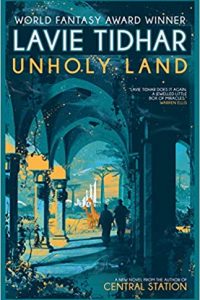Faren Miller reviews Sally Gardner
 Maggot Moon by Sally Gardner is the offbeat tale of a boy living under a dictatorship that could be a very alternate take on mid-’50s England. The most unusual thing about Standish Treadwell isn’t his mismatched blue and brown eyes (as shown on the cover), but the dyslexia he shares with the author – a strong advocate for people with this disability. Before he gets booted out of school, the one teacher who sees any promise in the lad calls him ‘‘a breeze in the park of imagination,’’ a comment which he interprets with characteristic bluntness as ‘‘an imagination that breezes through the park, doesn’t even see the benches, just notices that there is no dog shit where dog shit should be.’’
Maggot Moon by Sally Gardner is the offbeat tale of a boy living under a dictatorship that could be a very alternate take on mid-’50s England. The most unusual thing about Standish Treadwell isn’t his mismatched blue and brown eyes (as shown on the cover), but the dyslexia he shares with the author – a strong advocate for people with this disability. Before he gets booted out of school, the one teacher who sees any promise in the lad calls him ‘‘a breeze in the park of imagination,’’ a comment which he interprets with characteristic bluntness as ‘‘an imagination that breezes through the park, doesn’t even see the benches, just notices that there is no dog shit where dog shit should be.’’
Standish’s grim homeland seems to combine elements from Fascist Germany, Soviet Russia, and Margaret Thatcher’s Britain, with its fanatic pursuit of racial purity, blinkered media, and female leader whose stern looks are intimidating enough (‘‘hair a construction of steel wire… eyes unblinking’’), but whose ideas are truly chilling: ‘‘worms that buried themselves into your worried mind, to rot all thoughts of freedom.’’
Some glimpses of an altogether different lifestyle do sneak in from the great country across the ocean, where people are free to ‘‘sing in the rain, while dancing round a lamppost,’’ the land of ‘‘Croca Cola’’ and pastel Cadillacs. It’s clearly inspired by America in the 1950s, but the whole thing seems so alien, Standish and his young friend Hector displace it to their own invention, ‘‘planet Juniper.’’ Even before Hector joins the ranks of the Vanished (along with both of Standish’s parents), everyday life is riddled with loss, decay, and deception – embodied in chapter-heading illustrations which begin with a stray fly, move on to rats and poison, and then a growing heap of maggots. Even the Moon is somehow radioactive, and the much-touted national mission there amounts to a pack of lies.
Dyslexia, dystopia… despair? But no! Maggot Moon finds sources of hope in unexpected places, most notably in its young hero’s ability to cut through the propaganda and to find his own form of courage, determined to pursue dreams of unrestricted life ‘‘at the end of the rainbow,’’ where the sun shines unabashed ‘‘in Technicolor.’’





